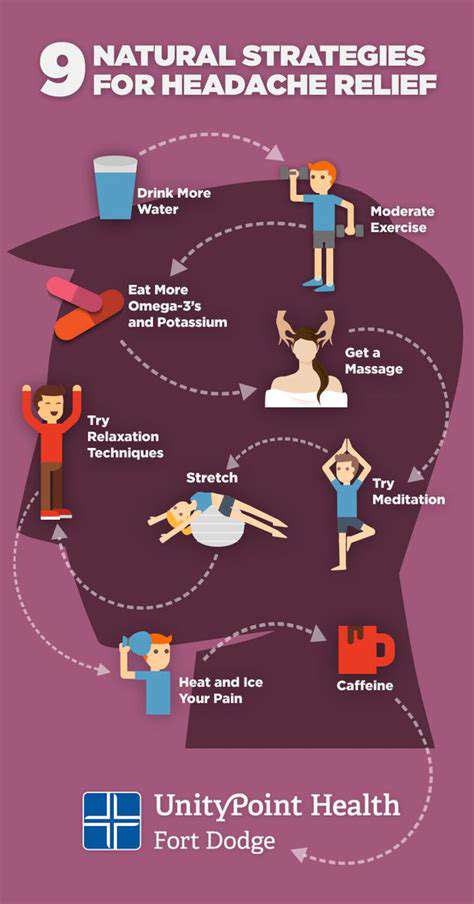Common Culprits Behind Morning Headaches

Dehydration, often overlooked, plays a significant role in triggering morning headaches. During sleep, the body naturally loses fluids through respiration and perspiration, even if you're not actively sweating. When the body is dehydrated, the brain, which is primarily composed of water, can shrink slightly, putting pressure on the surrounding tissues and leading to a headache. This is further exacerbated by the fact that you haven't been consuming any liquids for several hours during the night. Ensuring adequate fluid intake throughout the day and before bed is crucial for preventing these headaches, and even carrying a water bottle throughout your day can make a significant difference.
Sleep disruption, encompassing both insufficient sleep duration and poor sleep quality, is another prevalent cause of morning headaches. Insomnia, sleep apnea, and even restless leg syndrome can all interfere with the body's natural sleep cycle, leading to imbalances in neurotransmitters and hormones. These imbalances can trigger pain pathways in the brain, manifesting as a throbbing headache upon waking. Furthermore, frequent awakenings and shallow sleep prevent the body from undergoing restorative processes that help to repair and rejuvenate the brain, further contributing to morning headache susceptibility. Consider evaluating your sleep environment and habits to ensure optimal sleep quality and duration.
Alcohol consumption, especially close to bedtime, is notorious for disrupting sleep patterns and leading to dehydration. Alcohol interferes with the production of vasopressin, a hormone that helps the kidneys retain water. This results in increased urination and fluid loss, contributing to dehydration. Additionally, alcohol can disrupt sleep architecture, reducing the amount of restful deep sleep and potentially triggering headaches. Even moderate alcohol intake before bed can increase the likelihood of waking up with a headache, making moderation or abstinence particularly important for headache sufferers.
Grinding or clenching teeth during sleep, a condition known as bruxism, is a common yet often overlooked cause of morning headaches and jaw pain. This unconscious activity puts significant strain on the muscles of the jaw, face, and neck. This muscle tension can radiate upwards, affecting the temples and forehead and resulting in a headache. Many individuals are unaware that they grind their teeth, but a partner might notice the grinding sound. Using a mouthguard can alleviate bruxism, and help ease these headaches.
Skipping or delaying meals, especially breakfast, can also contribute to morning headaches. When the body is deprived of food for an extended period, blood sugar levels drop. This can trigger the release of stress hormones, like cortisol, which can then lead to the constriction of blood vessels, reduced blood flow to the brain, and ultimately a headache. Eating a balanced breakfast within an hour or two of waking up helps to stabilize blood sugar levels and prevent these headaches.
Environmental Factors and Sleep PositionEnvironmental factors within your bedroom can significantly impact the likelihood of experiencing morning headaches. Poor air quality, characterized by inadequate ventilation or the presence of allergens, can irritate the sinuses and trigger headaches. Stale air or the presence of dust mites or mold can also disrupt sleep and contribute to headache development. Ensuring a well-ventilated bedroom, using an air purifier, and keeping the room free of potential allergens are crucial steps in minimizing the risk of headaches, and should be a regular part of your nighttime routine.
Changes in the weather, particularly fluctuations in barometric pressure, have been linked to an increased incidence of headaches in some individuals. These shifts can impact the pressure within the sinuses, leading to pain and discomfort. During seasons with rapid weather changes, being aware of your susceptibility to weather-related headaches and taking preventative measures, such as staying hydrated and maintaining a consistent sleep schedule, can prove helpful. Consulting with a medical professional may also be necessary to get personalized advice.
Incorrect sleep posture, especially the position of your head and neck, can contribute to morning headaches. Sleeping in a position that strains the neck muscles or puts pressure on nerves can cause muscle tension, leading to headaches. Using a supportive pillow that maintains the natural alignment of the spine is crucial. Experimenting with different pillows and sleep positions to find the one that best supports your head and neck can significantly reduce the frequency of morning headaches.
Exposure to loud noises, especially during sleep, can disrupt the sleep cycle and trigger headaches. Noise pollution can interfere with the body's ability to enter deep, restorative sleep, leading to a build-up of stress and tension. Using earplugs or a white noise machine can help to minimize the impact of external noise and create a more conducive sleep environment, promoting a more restful night and reducing the likelihood of waking up with a headache.
Exposure to strong odors or chemical fumes can trigger headaches in sensitive individuals. Perfumes, cleaning products, and even certain foods can release volatile organic compounds (VOCs) that irritate the nasal passages and trigger headaches. Ensuring that your bedroom is free from strong smells and opting for natural, unscented products can minimize exposure to these potential triggers. Moreover, ventilation is essential for maintaining air quality, which can help to reduce the presence of bothersome smells.
Underlying Medical Conditions and Medication Side EffectsCertain underlying medical conditions can manifest as morning headaches. Sinus infections, characterized by inflammation and pressure in the sinus cavities, can cause headaches that are often most severe in the morning due to the accumulation of mucus overnight. Untreated high blood pressure, or hypertension, can also be associated with morning headaches, alongside other more severe health risks. Consult a doctor if you experience frequent morning headaches to exclude any underlying medical conditions and get a proper diagnosis.
Migraines, a neurological disorder characterized by severe headaches, often present with morning headaches, and it's often combined with nausea, vomiting, and sensitivity to light and sound. These headaches can interfere with daily functioning and severely impact quality of life. Keeping a headache diary can help identify potential triggers, such as certain foods or stressors. A neurologist should be seen for assessment and guidance on effective migraine treatment, and a comprehensive treatment plan should be discussed.
Medication side effects can sometimes manifest as morning headaches. Certain medications, including some blood pressure medications, antidepressants, and hormone replacement therapies, have been linked to headaches as a potential side effect. Reviewing your medication list with your doctor is important to identify any potential culprits. It is important to discuss your headaches with your prescribing physician to assess if adjustments to your medication regimen are required.
Sleep apnea, a condition characterized by repeated pauses in breathing during sleep, can also lead to morning headaches. The reduced oxygen levels during sleep can trigger headaches. Sleep apnea is often associated with daytime sleepiness and snoring, which can be indicators of this condition. A sleep study is typically required to diagnose sleep apnea, and treatment options include lifestyle changes, continuous positive airway pressure (CPAP) therapy, and oral appliances to help improve your sleep.
Glaucoma, a condition that damages the optic nerve, which can cause eye pain and headaches, is another medical issue to be aware of. While not always associated with morning headaches specifically, it's possible. If you experience any vision changes or eye pain along with your headaches, a visit to an ophthalmologist is necessary to rule out glaucoma or other vision-related problems. This is a serious condition, early detection and management are key to protecting your vision.
Finding Relief: Strategies for a Headache-Free Morning

Waking up with a throbbing head can be a truly disruptive experience, and understanding the underlying causes is the first crucial step towards finding effective relief. One of the most prevalent culprits is sleep disturbances, whether it's insomnia, sleep apnea, or simply a restless night's sleep. These conditions can disrupt the delicate balance of neurotransmitters in the brain, triggering headaches upon waking. Another significant factor is dehydration; the body loses fluids overnight, and if you're already slightly dehydrated before bed, the morning can bring on a headache as your brain tissues are deprived of the necessary hydration, leading to inflammation and pain.
Furthermore, dietary choices and habits the night before can significantly contribute to morning headaches. Consuming excessive amounts of alcohol, especially close to bedtime, can lead to dehydration and vasodilation, potentially causing headaches when you wake up. Certain foods, such as aged cheeses, processed meats, and those containing high levels of tyramine or nitrates, have been linked to migraine and other types of headaches, and their effects may be most pronounced overnight, resulting in a sore head in the morning. Additionally, if you have a caffeine dependency, withdrawing from caffeine overnight can also be a trigger, so be mindful of your intake.
Beyond these common factors, environmental influences also play a role in the onset of morning headaches. Changes in barometric pressure or exposure to allergens can trigger headaches in susceptible individuals. The quality of your sleeping environment is also paramount. A poorly ventilated room, exposure to excessive noise or light, or an uncomfortable sleeping position can all contribute to morning headache occurrence. It's essential to carefully evaluate these external factors and make necessary adjustments to optimize your sleep environment and minimize potential triggers to safeguard against morning head pain.
Cultivating a Headache-Free Awakening: Practical Solutions and Preventive MeasuresFortunately, there are various proactive steps you can take to minimize the likelihood of experiencing a headache when you wake up, paving the way for a brighter and more energized start to your day. Maintaining a consistent sleep schedule is paramount; going to bed and waking up at the same time each day, even on weekends, helps regulate your body's natural sleep-wake cycle, reducing the risk of sleep-related headaches. Proper hydration is equally critical; drink enough water throughout the day, and keep a glass of water by your bedside for easy access in case of overnight thirst or potential dehydration to prevent the onset of headache.
Moreover, be mindful of your dietary choices, particularly in the evening, to reduce the risk of headache triggers. Avoid consuming excessive alcohol, caffeine, and foods known to cause headaches, such as aged cheese and processed meats, before bedtime. Creating a comfortable and relaxing sleep environment is also essential. Ensure your bedroom is dark, quiet, and cool. Using a comfortable pillow and mattress, and maintaining good posture while sleeping, can help minimize the risk of neck and shoulder tension, which can contribute to headaches. Also consider practicing relaxation techniques before bed, such as deep breathing or meditation to improve sleep quality.
Finally, addressing underlying medical conditions is very important. If you experience frequent morning headaches, it's important to consult with a doctor to rule out any underlying medical issues, such as sleep apnea or chronic migraines. They can provide tailored advice and recommend treatments to address your specific needs and prevent the onset of morning headaches. Keeping a headache diary to track the frequency, intensity, and potential triggers of your headaches can also be a very useful strategy. This information helps identify patterns and potential triggers, and the knowledge helps inform preventive measures and facilitates better communication with your healthcare provider, enabling a comprehensive and personalized approach to headache management.